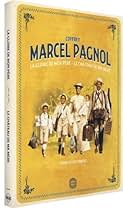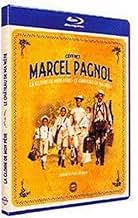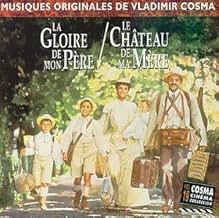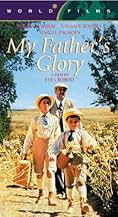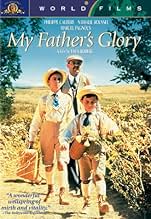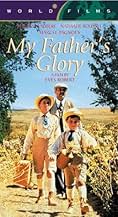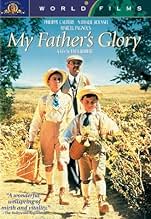AVALIAÇÃO DA IMDb
7,6/10
7,4 mil
SUA AVALIAÇÃO
No final do século XIX, o pequeno Marcel vive com seus pais no interior da Provença. Durante suas férias, Marcel conhece Lili, um garoto local que conhece todos os segredos das colinas, e os... Ler tudoNo final do século XIX, o pequeno Marcel vive com seus pais no interior da Provença. Durante suas férias, Marcel conhece Lili, um garoto local que conhece todos os segredos das colinas, e os dois se tornam amigos rapidamente.No final do século XIX, o pequeno Marcel vive com seus pais no interior da Provença. Durante suas férias, Marcel conhece Lili, um garoto local que conhece todos os segredos das colinas, e os dois se tornam amigos rapidamente.
- Direção
- Roteiristas
- Artistas
- Prêmios
- 2 vitórias e 5 indicações no total
Avaliações em destaque
10eustfam
The story is simple--it is about a young boy who spent his summers in the hills of Provence--yet it manages to tug the viewer at the heart. It is such a far cry from the families we see today who have no time to relate to each other. The boy's love for his father (and mother)clearly shines in this film.
The father is a school teacher, an atheist, and a republican. But he is a loving husband and a great father to his children. The mother is shy and affectionate and is sensitive the needs of her husband and children. So what makes this film such an enchanting experience? Since I am not a writer, I cannot really put into words the way I felt after watching this film. I know it left a smile in my heart...it also made me nostalgic for it reminded me of my own childhood. I wanted it to go on long after the movie ended. Watch it and you will know what I mean. It will take you back to the magical moments of growing up.
The father is a school teacher, an atheist, and a republican. But he is a loving husband and a great father to his children. The mother is shy and affectionate and is sensitive the needs of her husband and children. So what makes this film such an enchanting experience? Since I am not a writer, I cannot really put into words the way I felt after watching this film. I know it left a smile in my heart...it also made me nostalgic for it reminded me of my own childhood. I wanted it to go on long after the movie ended. Watch it and you will know what I mean. It will take you back to the magical moments of growing up.
Marcel Pagnol always wanted to adapt for the screen his childhood memories that he related in 4 novels. Unfortunately, he died without he made his plan. So, it was one of his friends, Yves Robert who undertook to make the coveted movie and the result turns out to be very convincing. Yves Robert's movie restitutes perfectly the atmosphere of Pagnol's book and he made a tender, hearty movie, lulled by Vladimir Cosma's nonchalant music where the shiny sun and sky of Provence reply to the wild beauty of the hills. These hills will make the little Marcel's enchantment. Thanks to a fluid making, Robert films the happiness and the naïvety of childhood with a certain impishness. Besides, Robert always enjoyed filming childhood like Truffaut and we particularly rediscover the quoted impishness in one of his movies: "la guerre des boutons". Robert introduces us the Pagnol's family and shows liking towards his characters. More than Marcel's character, these are his feelings towards his family which Robert tries to define, especially the pride towards his lucid and ambitious father (excellent Philippe Caubère) after his hunting achievement. Moreover, he loves tenderly his mother but tends to despise his uncle. He blames him for being a liar and a conceited person. At the end, a limpid movie that remembers with nostalgia of a past era. Pagnol would certainly have appreciated the result. If the movie introduces a bitter end, it depicts the last picture as something symbolic: " the glory of Marcel's father".
"My Father's Glory," and its sequel "My Mother's Castle," tell the story of a young boy's "wonder years" growing up in a family with an adored father, a lovely but frail mother, and assorted eccentric relatives and friends. These are incredibly charming films that feature none of the violent action and highly charged emotions that we've come to expect in popular films today. Instead, they celebrate the simple joys of life in a warm and loving family. When minor but unexpected events occasionally disrupt the day-to-day flow of events, they can seem like terrible disasters. On the other hand, a simple visit to the country can seem like a tremendous adventure. It's not necessary to have seen "My Father's Glory" to enjoy "My Mother's Castle." In fact, I happened to see them out of order and I loved them just the same. But if I had my preference, I'd watch them in order. The final scene of "My Mother's Castle" is emotionally powerful and satisfying; for me it confirmed that every minute I'd invested in these films was worthwhile. I wanted to get up there on the screen and help. In French with English subtitles.
This film is simply beautiful. Loaded with emotion. Marcel Pagnol's story as a kid growing up in Southern France.
This is a film I saw for the first time about 10 years ago. 10 years later, I enjoyed it even more. Yves Robert makes you care for characters. Philippe Caubère is brilliant as the father, who's a teacher. The truly beautiful Nathalie Roussel: the caring mother and wife. Young Julien Ciamaca gives a strong performance as Marcel. And what about Didier Pain: I just love his way of playing Oncle Jules.
Perhaps the greatest accomplishment of this movie is to make you travel to this part of the world, to make you feel that you're there when the story unfolds.
87/100 (***½)
Seen at home, in Toronto, on June 16th, 2002.
This is a film I saw for the first time about 10 years ago. 10 years later, I enjoyed it even more. Yves Robert makes you care for characters. Philippe Caubère is brilliant as the father, who's a teacher. The truly beautiful Nathalie Roussel: the caring mother and wife. Young Julien Ciamaca gives a strong performance as Marcel. And what about Didier Pain: I just love his way of playing Oncle Jules.
Perhaps the greatest accomplishment of this movie is to make you travel to this part of the world, to make you feel that you're there when the story unfolds.
87/100 (***½)
Seen at home, in Toronto, on June 16th, 2002.
This film takes us back to 1900 and depicts a family with children who are refreshingly innocent, yet believable and amusing every step of the way. The story takes us on a journey with Marcel, the narrator, who thinks his father is superhuman and refuses to see him as anything less. To view life through Marcel's eyes is enchanting; he is so easily spellbound by his surroundings, so in love with the hills of his native Provence.
The cinematography is absolutely breath-taking, giving one the feeling of watching poetry in motion. The scene at the park on a Sunday afternoon is like watching a painting come to life. But cinematography is only a feather on the cap of this first rate production. The direction is superb, and the performances very touching.
I recommend this film highly. It is good as a visual sedative, and the only side effect it might have is a possible urge to quit your job, pack it up, and move to the French countryside writer Marcel Pagnol so loved.
The cinematography is absolutely breath-taking, giving one the feeling of watching poetry in motion. The scene at the park on a Sunday afternoon is like watching a painting come to life. But cinematography is only a feather on the cap of this first rate production. The direction is superb, and the performances very touching.
I recommend this film highly. It is good as a visual sedative, and the only side effect it might have is a possible urge to quit your job, pack it up, and move to the French countryside writer Marcel Pagnol so loved.
Você sabia?
- Curiosidades'La Gloire de mon père', published in France in 1957, is the first volume of four autobiographical novels by Marcel Pagnol. The second volume, 'Le château de ma mere', was published in 1958. In the novels, Marcel's meeting Lili takes place in volume two, as does Marcel's decision to stay at Provence as a hermit. The two novels were translated into English and published by Doubleday (in the U.S) as a single book in 1960 under the title 'The Days Were Too Short', This translation was reprinted by North Point Press as a single book titled 'My Father's Glory / and / My Mother's Castle' in 1986.
- Erros de gravaçãoOn the family's holiday, each time that it is raining the sky is bright and without a cloud (except the scene with the storm).
- Citações
Augustine: You need your gun to go shopping?
Joseph Pagnol: You never know.
Principais escolhas
Faça login para avaliar e ver a lista de recomendações personalizadas
- How long is My Father's Glory?Fornecido pela Alexa
Detalhes
- Data de lançamento
- País de origem
- Idiomas
- Também conhecido como
- My Father's Glory
- Locações de filme
- Signes, Var, França(bird hunting party)
- Empresas de produção
- Consulte mais créditos da empresa na IMDbPro
Bilheteria
- Faturamento bruto nos EUA e Canadá
- US$ 1.730.856
- Faturamento bruto mundial
- US$ 1.730.856
- Tempo de duração1 hora 45 minutos
- Cor
- Proporção
- 1.85 : 1
Contribua para esta página
Sugerir uma alteração ou adicionar conteúdo ausente

Principal brecha
By what name was A Glória de Meu Pai (1990) officially released in India in English?
Responda
![Assistir a Bande-annonce [OV]](https://m.media-amazon.com/images/M/MV5BNjNlYzQ0NGQtODdlNS00YzRmLTlhYzQtZDdiOTNiZDZlYWYzXkEyXkFqcGdeQXRyYW5zY29kZS13b3JrZmxvdw@@._V1_QL75_UX500_CR0)

